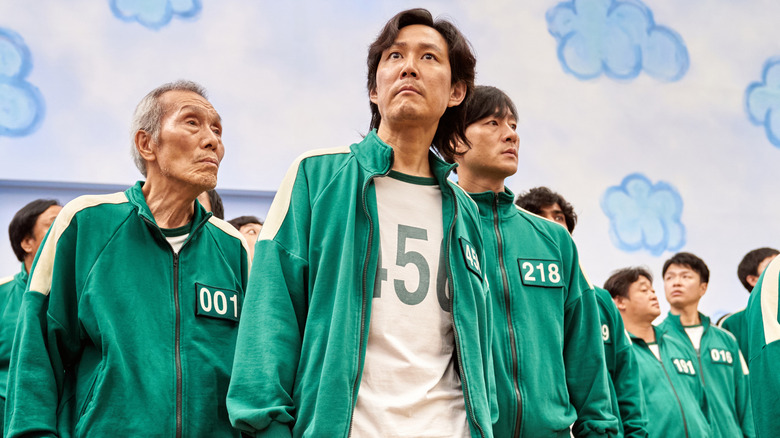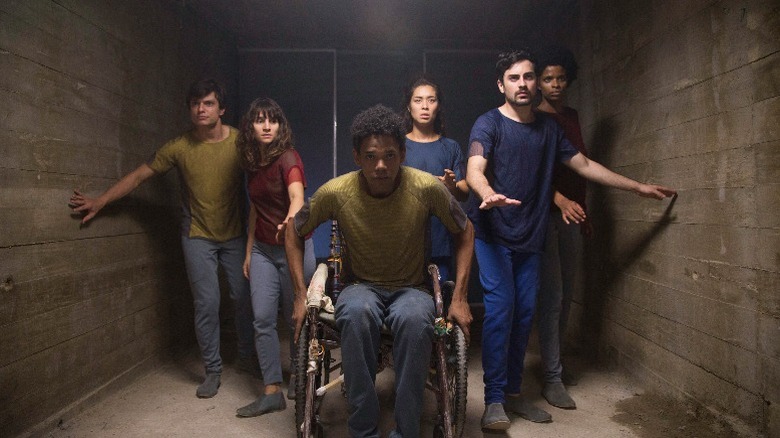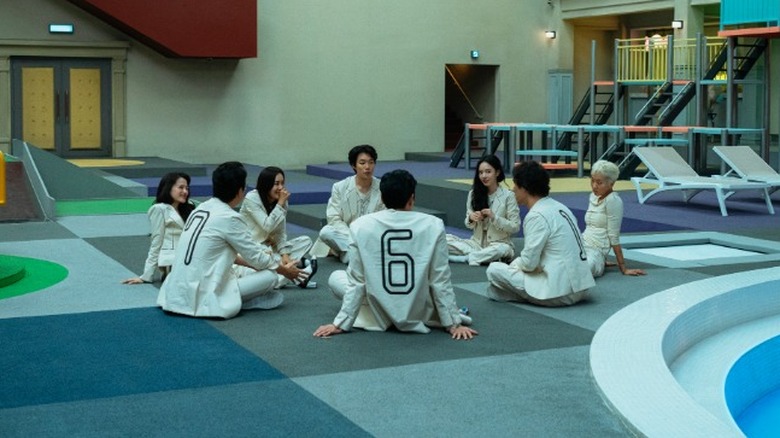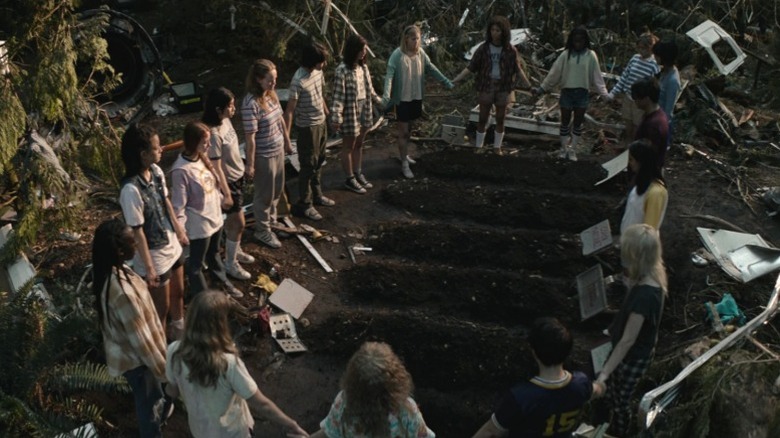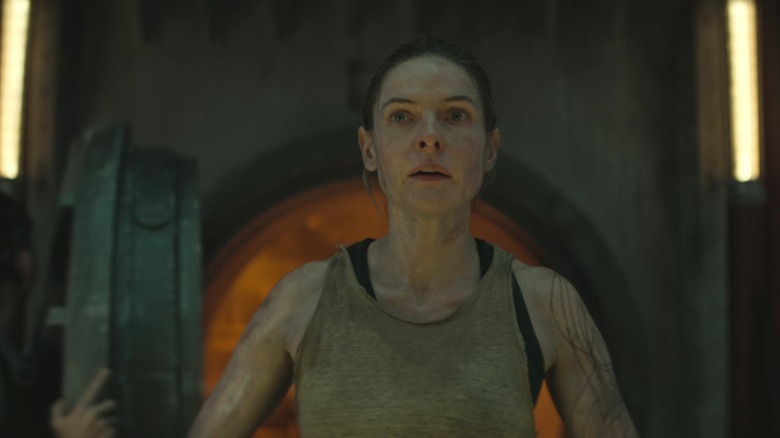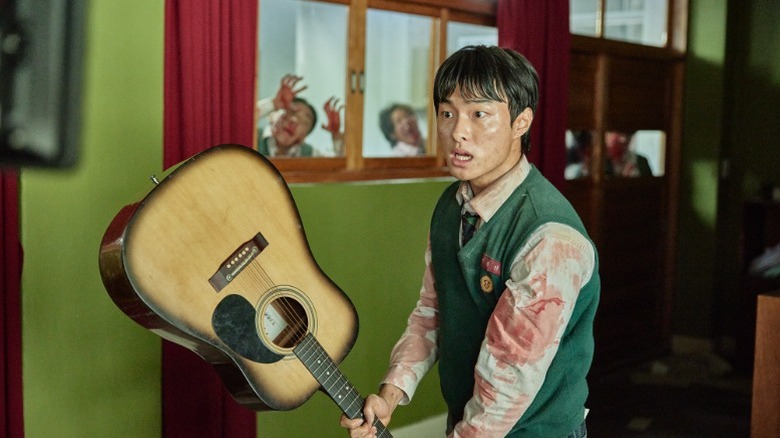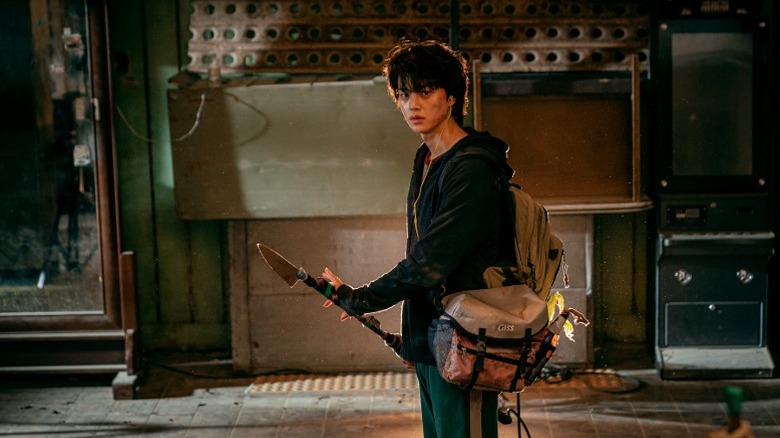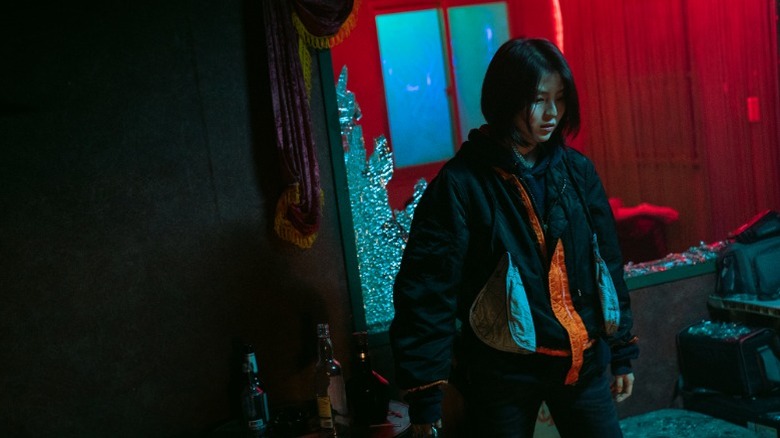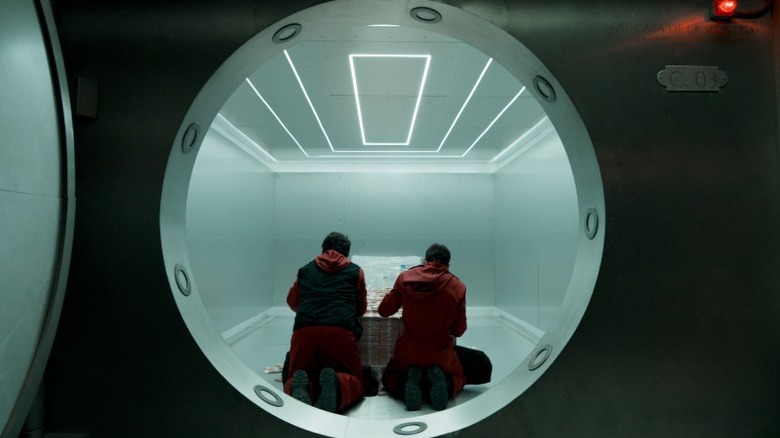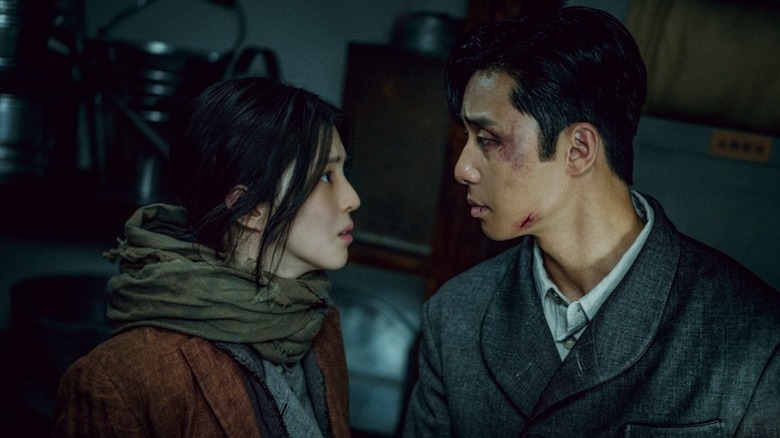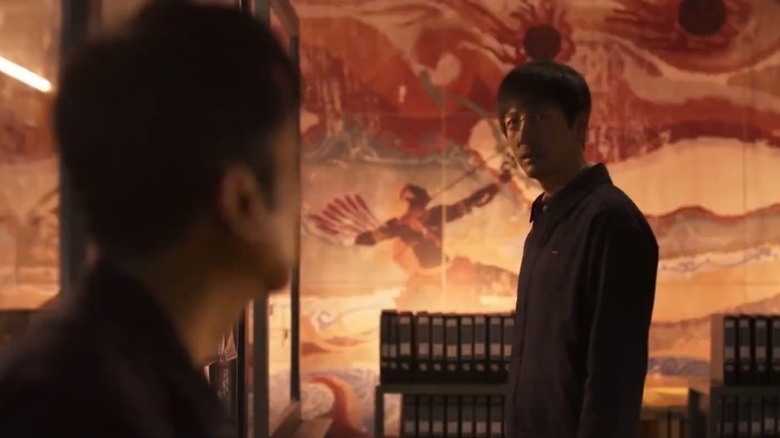15 Best TV Shows Like Squid Game You Need To Watch Next
Season 3 of Netflix's "Squid Game" may have proven to be a controversial outing — Looper called it a disappointing ending for an inventive story in our review — but the fact remains that the South Korean horror thriller series is one of the biggest TV phenomenons of all time, and will be marching into the TV afterlife with legions of fans around the world to remember it.
If you're among those fans and are now itching for something to fill the dalgona-sized hole in your heart left by the conclusion of "Squid Game," fret not: We've compiled a list of 15 great similar shows. While you'd be surprised by how many thriller series about deadly games there are out there, the list is not limited to those, and also includes shows that share thematic, stylistic, or tonal ground with "Squid Game." Whatever the case, these are all very worthy helpings of television for your next binging session.
Alice in Borderland
The Japanese thriller series "Alice in Borderland" is probably the go-to example of a show usually enjoyed by fans of "Squid Game." That overlap in enjoyment is due not only to its aesthetic and tonal similarities — as an analogous Netflix show from around the same time period (it premiered in 2020, just under a year before "Squid Game," and has aired two seasons so far) — but to its narrative focus and structure, also centered around deadly sadistic games and the players gnawing their way through them.
In the show's universe, a group of people suddenly find themselves in a deserted version of Tokyo, with several special locations known as "game arenas" scattered across the city. To avoid annihilation by a mysterious laser beam shot from the sky, they are given visas that must be extended by wandering from arena to arena and playing games of varying levels of difficulty. Trippier, eerier, and somewhat slower to unveil its mysteries and the nature of its world than "Squid Game," it's nonetheless a show that pulls you into a comparably inescapable grip.
3%
Another international Netflix hit focused on a deadly contest to win better living standards is Brazil's "3%" — a show so like "Squid Game" in premise that it pretty much counts as a historical predecessor.
The show, which aired four seasons between 2016 and 2020, tells the story of a group of young people in a dystopian future society divided between the poor and downtrodden of the "Inland" and the wealthy citizens of the idyllic "Offshore." Every year, all 20-year-olds in the Inland are given the opportunity to participate in "The Process," a series of games that, if successfully completed, will give them access to the Offshore society — but only 3% of applicants will succeed.
Much like "Squid Game," "3%" literalizes class tension through high-stakes trials that are as gripping to watch as they are bitterly ironic, and eventually expands its scope beyond the games themselves to focus on the broader political context and the brewing insurgency against the cruel central institution. In this case, there's also the benefit of a whole, rich fictional universe to explore.
The 8 Show
If "3%" could be called a predecessor to "Squid Game," "The 8 Show" very much qualifies as a spiritual successor. This 2024 Netflix series even occupies a close aesthetic ballpark to "Squid Game," setting most of its action within the claustrophobic, labyrinthine corridors of a bizarre closed-off facility. But where "Squid Game" uses its killer game as the engine for a story about political and economic oppression, "The 8 Show" is more interested in the social experiment of it all.
In other words, while lighter on violence, it's in some ways a much more morbid show, as you can tell just from a look at its synopsis: Eight strangers are invited to take part in a reality show where they must remain locked in an eight-story concrete building for 100 days, with a prize of 44.8 billion won (equivalent to approximately 30 million dollars) awaiting them at the end, to be divided equally.
While there, however, they must buy basic provisions at 1000 times the regular price using their future prize money — and, as the game goes on, it quickly emerges that players on different floors have vastly different levels of privilege. Chaos ensues, as well as plenty of can't-look-away fascination for the viewer, who gets to watch these eight vastly different personalities go at each other's throats.
Yellowjackets
While "Squid Game" and Showtime's "Yellowjackets" — arguably TV's best survival thriller — couldn't be more different in terms of their premises, they are still shows with a lot in common spiritually. At heart, both are treatises on the transformations that humans and their relationships can go through under extreme duress, and (from Season 2 onward, in the case of "Squid Game") on the profound ways trauma and survivor's guilt can shape people and alter their basic reality.
With "Yellowjackets," however, the isolation that brings about said trauma and guilt stems not from human greed but from pure, cruel chance. A plane crashes deep in the Canadian wilderness, carrying a high school girls' soccer team from New Jersey known as the Yellowjackets. They remain stranded from society for 19 months while awaiting rescue, and must resort to extreme measures — eventually including cannibalism — to survive, all while dealing with the already-pretty-harrowing emotional realities of adolescence.
While documenting that struggle, the show also follows the fraught present-day lives of several survivors — a diptych structure that allows "Yellowjackets" to probe deep into its overarching themes while still offering increasingly intense and raucous entertainment.
Silo
If any two shows can be taken as calling cards for the artistic brands of their respective streaming services, it's "Squid Game" and "Silo." It wouldn't be a stretch to call them, respectively, the Netflix and Apple TV+ takes on the concept of a prestige dystopian isolation thriller, both set within closed quarters that stand in allegorically for society as a whole while still functioning as their own cramped-up, highly particular organisms.
Rebecca Ferguson stars as Juliette Nichols, a generator engineer who works at the Silo — a massive 144-level underground facility existing somewhere in the far-off dystopian future. Its 10,000 inhabitants live by a strict set of rules, and know nothing about life outside or before the Silo; all they're told is that everything above ground is dead, and compliance with the Silo's regulations is necessary for survival. Soon enough, however, Juliette begins to make discoveries about the Silo that may completely unravel the world she thinks she knows.
While "Silo" doesn't come with the built-in dramatic thrust of a game, it's still one of the most engrossing series currently on air. And, in addition to being excellently crafted all around (it even made one of its best calls before its first episode aired), "Silo" makes the absolute most of a theoretically drab setting — one that lacks the bright colors of "Squid Game" by design, but turns out to be just as fascinating of a maze.
All of Us Are Dead
South Korean television thrillers have been on a roll for the past few years, and Netflix has been at the forefront of that good moment with not only "Squid Game" and "The 8 Show" but also "All of Us Are Dead" — which, despite not involving any games, does share those two shows' preoccupation with isolation and the challenges of collaborating in the name of survival.
Set in the fictional city of Hyosan, "All of Us Are Dead" is an adaptation of the eponymous webtoon by Joo Dong-geun, and follows the aftermath of a zombie outbreak caused by a high school science teacher's (Kim Byung-chul) catastrophic experiment. The show depicts the outbreak from the point of view of a group of students who are trapped in the school, with no way to communicate with the outside world, and follows the tensions that ensue as they try to find a way out without succumbing to the rapidly-spreading Jonas Virus. If that sounds like a nerve-racking time, that's because it is: "All of Us Are Dead" arguably out-stresses "Squid Game" with its relentless, chaotic struggle for survival.
Sweet Home
Premiering on Netflix one year before "Squid Game" and running for three seasons, the already-concluded "Sweet Home" begins in a somewhat more grounded register, or so it seems. High school dropout Hyun-su (Song Kang) is living in a rundown apartment complex known as Green Home, and is struggling to cope with what we later learn to have been a car accident that killed his entire family. The show's evocation of the overwhelming bleakness of grief, directionlessness, and depression packs enough of a punch before we've even gotten to the meat of the premise. And then the monsters show up.
As it turns out, the entire city has been overrun by terrifying superpowered creatures, into which people are being transformed by a bizarre infection. Hyun-su and the rest of the residents seal themselves off inside Green Home and scramble for ways to deal with the situation, as it becomes clear that the monsters are dead-set on destroying the world. It's a brutal, often terrifying show, but what makes it unique among the crop of recent South Korean survival thrillers on Netflix is its incredible emotional wallop.
My Name
Although there are plenty of options for those looking specifically to watch thriller series centered around isolation and survival, a show doesn't have to be explicitly that in order to be of interest to "Squid Game" fans. 2021's "My Name," for instance, is a crime caper — but its dark tone, dense plotting, and highly volatile character relationships should be a full-course meal for anyone who enjoyed "Squid Game."
With a single season released on Netflix one month after Season 1 of "Squid Game," "My Name" tells the story of Yoon Ji-woo (Han So-hee), whose gangster father (Yoon Kyung-ho) is one day killed in front of her by a mysterious hooded man. Ji-woo becomes obsessed with avenging her father's death, which leads her to join his former gang, led by Choi Mu-jin (Park Hee-soon). She eventually learns that her father's killer is most likely a police officer, and subsequently assumes a new identity to infiltrate the police force as a mole for Mu-jin's gang. It's best not to say much else, lest we ruin the surprise of watching for yourself where Ji-woo's double life leads her.
Pyramid Game
Although "Pyramid Game" is another South Korean thriller series with a bitter competition as the central subject matter, the kind of "game" played in it is vastly different from what we see in "Squid Game." Based on the eponymous webtoon by Dalgonyak, this 2024 show, released on Paramount+ in the U.S., is a kind of "Mean Girls" from hell — or, more accurately, a subversive horror-tinged take on high school social hierarchy tropes.
The highly stressful plot follows Soo-ji, a new student at Baekyeon Girls' High School in Seoul. Upon arriving, Soo-ji learns the hard way that the school operates under a bizarre code of normalized violence: Every month, the students in class 2-5 take a popularity vote, and the least popular among them becomes an acceptable target for violence and vicious bullying.
As she endures her place at the bottom of the pyramid and despairs at her classmates' indifference to her suffering, Soo-ji endeavors to start a revolution in the school. It's perfect viewing for anyone who craves a bit of the "Squid Game" dynamic in a completely unique but equally compelling context.
Kaiji
While most of the shows on this list are live-action, any credible roster of TV series similar to "Squid Game" must include at least one anime, and that's "Kaiji." Divided into two seasons with different titles — "Kaiji: Ultimate Survivor" and "Kaiji: Against All Rules," each of which adapts one part of the "Kaiji" manga series by Nobuyuki Fukumoto — this Nippon TV series is a little less dark and brutal than "Squid Game." But its narrative framing is strikingly similar; to give you an idea, it also starts with a man in debt who's offered the opportunity to participate in a desperate game for money.
The difference, in the case of "Kaiji," is that, instead of a mysterious massive production involving deadly consequences, the nature of the game is a lot more straightforward: Simply put, Kaiji becomes a high-stakes card player. The show follows his efforts to make the most of the bizarre, increasingly violent gambling world into which he's been embroiled, and boasts so many twists and so much increasing tension that you'll feel as though you're the one playing.
Money Heist
One of Netflix's biggest global hits, the Spanish series "Money Heist" was a notable precursor to "Squid Game" — not only in its tone and mythology-heavy approach, but in the cultural barriers it broke through drawing worldwide viewers to a television production by a non-anglophone country. Its idiosyncratic visual conception and thoroughly flehsed-out world-building may well have been an inspiration for "Squid Game" as well.
Continuing this list's theme of nail-biting close-quarters action, "Money Heist" tells the story of an elaborate plan to steal €984 million (equal to more than $1.1 billion) from the Royal Mint of Spain, as conceived by a mysterious figure known as the Professor (Álvaro Morte), who recruits a team of eight anonymous robbers to assist him. The ensuing heist is depicted nonlinearly, with constant jumps between past and present to amp up the tension, the twistiness, and especially the character stakes.
Originally intended as a two-season series, the show became such a hit that Netflix ultimately ordered three seasons divided into five total parts — and each of those parts is its own masterclass in breathless, kinetic entertainment.
Gyeongseong Creature
If most of the stories of oppression and confinement on this list are related to fictional narratives and universes, there is one interesting example of a show that shares a lot of commonalities with "Squid Game" yet derives its story — or at least its framing — largely from real life. Inspired by an actual World War II Japanese military unit, "Gyeongseong Creature" is a period drama that serves as a reminder that all fictional dystopias are rooted in humanity's real history of oppression and violence.
The Netflix series is set in 1945, during the occupation of Seoul — then known as Gyenongseong — by the Imperial Japanese Army. Its plot follows Tae-sang (Park Seo-joon) and Chae-ok (Han So-hee, who also stars in "My Name"), two Gyeongseong citizens who, while contending with the Japanese army's brutality, must confront a bizarre creature created by their occupiers' ruthless biological experiments.
While its fantastical plot sends it in the direction of sci-fi and horror, "Gyeongseong Creature" is a grounded, meditative, and deeply serious account of a tragic time in Korea often overlooked by the Western world — as well as perfect viewing for any "Squid Game" fan looking for another engrossing thriller.
Death's Game
One of the most unique and captivating genre series of the past few years, in South Korea or elsewhere, is "Death's Game," adapted from the eponymous webtoon by Lee Won-sik and Ggulchan and currently consisting of a single two-part season.
The premise: Young, chronically unemployed Yee-jae (Seo In-guk) attempts suicide, leading an aghast Death (Park So-dam, of "Parasite" fame) to condemn him to a cycle of 12 reincarnations, at the end of which he will be sent to hell — unless he manages to prevent one of his vessels from their imminent death, in which case he can live out a new life as the person in question.
Much like "Squid Game," it's a show where the inner-world task dynamics add even more compulsive watchability to an already sturdy feat of thriller construction, with writer-director Ha Byung-hoon exhibiting an almost otherworldly command of agile tonal shifts as the story's twists and turns pile up. Park So-dam's Death is, for all her snark and duplicity, an irresistibly charismatic figure. And underlying it all is a genuinely touching story about the nature and the value of human life.
If you or someone you know is struggling or in crisis, help is available. Call or text 988 or chat 988lifeline.org
Three-Body
You may have heard of "3 Body Problem," Netflix's big-budget sci-fi series from Alexander Woo and vaunted "Game of Thrones" showrunners David Benioff and D. B. Weiss. But while the American version is pretty watchable on its own, it doesn't beat the original: Released one year prior in early 2023, the Chinese production "Three-Body" is based on same Liu Cixin novel, but adapts it with much more thoughtfulness and aplomb.
The show's plot is so heavy on complexity and science particulars — much more so in the Chinese version — that it's hard to sum up, and best discovered with little foreknowledge. But the gist is that, in 2007, strange things are happening on Earth, and nanomaterials specialist Wang Miao (Zhang Luyi) is recruited to take part in an investigation into what may be an impending alien invasion — with a virtual reality game possibly holding the key to uncovering the truth. It's a sleek, cerebral, riveting show that bears lots of stylistic similarities to "Squid Game," as well as plenty of narrative ones in its patient, paranoia-heavy unspooling of a big sprawling mystery.
The Glory
Another thriller series that doesn't exactly follow a similar narrative blueprint to "Squid Game" yet conducts itself in comparably transfixing fashion is "The Glory." This 2022-23 Netflix series takes school bullying as its subject, focusing on Dong-eun (Song Hye-kyo), an elementary school homeroom teacher who still carries the scars of the time she spent being bullied in high school.
Unbeknownst to everybody around her, Dong-eun has concocted an elaborate plan to enact revenge on her former tormentors, including Yeon-jin (Lim Ji-yeon), now a famous TV weather lady. Like "Squid Game," the show takes that potentially lurid premise and explores it with tact and sensitivity, mustering genuine empathy for its cast of characters that only serves to add further complication and tension to a treacherously escalating plot. Thanks to its violent bullying scenes, it's often a hard show to watch — but, if you can stomach it, it's enormously rewarding viewing.
